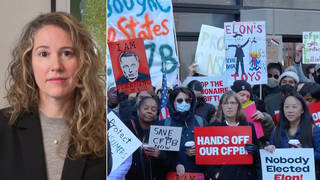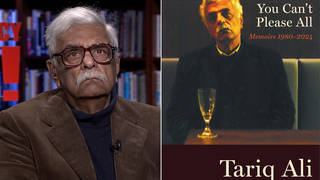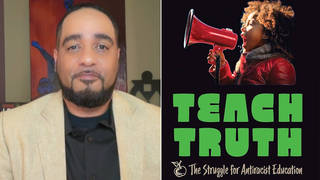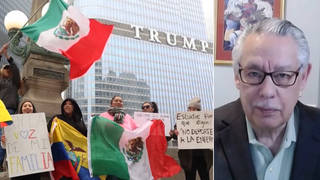
Related
Today marks both the first anniversary of the October 7 attack on Israel from the Gaza Strip and one week since Israel began its ground invasion of the neighboring country of Lebanon. Israel’s brutal military response to the Hamas-led October 7 incursion has shown no sign of slowing down as the United States, its primary supplier of military aid, continues to commit weapons, funding and rhetorical support to its deadly assault on Arab populations in Gaza, the West Bank and now Lebanon. Over 1,000 Lebanese civilians have been killed and over a million displaced as they flee the encroaching violence. From Beirut, we speak to Rima Majed, a professor at the American University of Beirut, who highlights the disruption to daily life that Israeli warfare has created. “This is really a huge catastrophe, and it’s not a humanitarian one. It is a political catastrophe, and it’s a social catastrophe. And this would not have happened … if it wasn’t for the [international] backing and the arming of Israel.”
Transcript
AMY GOODMAN: We end today’s show in Lebanon, where Israel has launched its heaviest bombardment to date on Beirut and the city’s southern suburbs. Earlier today, Israeli warplanes bombed a fire station in southern Lebanon, killing at least eight people. Israeli’s assault has now displaced 1.2 million people in Lebanon. Many have fled to Beirut from the south.
DISPLACED BEIRUT RESIDENT: [translated] We have been displaced for 10 days now. We don’t have food with us. We were not able to even go and bring new clothes. We left our homes and came here. Every night, there’s a strike. You cannot sleep. We came here, and we are unable to go back from where we came. Our situation is terrible. If someone is able to find any way to get out of the country, they should. It’s better than living on aid.
AMY GOODMAN: On Sunday, Hezbollah fired rockets at the Israeli port city of Haifa.
In Beirut, we’re joined by Rima Majed. She’s an assistant professor of sociology at the American University of Beirut.
You’re speaking to us from Beirut, where these massive explosions rocked the city over the weekend, marking the most violent night of Israeli attacks in recent weeks. We’re hearing reports of Israeli strikes pounding southern Beirut and a massive airstrike on Sunday near the city’s international airport. Describe what it’s like to be there, Rima.
RIMA MAJED: Thank you so much, Amy.
I mean, it’s, of course, horrible to be here. I mean, our nights are very long. Unfortunately, the heaviest bombing happens at night when people are getting ready to go to bed. But the past weekend and the weeks before have been really horrible. I mean, this week, it’s been mainly Beirut, but the south, the Beqaa and other areas have been very heavily hit in the weeks before. The situation is really very, very, very dire. I mean, I can go on for hours describing how horrible this whole situation is.
I mean, this is also a country where there is already — it’s a country that’s already suffering from multiple crises in the past five years, from one of the worst financial crises in the world, you know, the port explosion in 2020, of course COVID and its aftermath, earthquake last year, and a political deadlock that — where at the moment we have no president, a caretaker government, and a Parliament that has not convened since the beginning of this war. So we are talking about a situation that is very difficult.
And what I want to talk about is the effects of these bombs are massive, not just at — I mean, of course, at the humanitarian scale, but, I mean, I think the humanitarian aspect is something that people have become — I mean, it’s become very, very dehumanizing to just focus on humanitarianism. I mean, we’re talking about bare life here. I mean, all we care about is for people to just have shelter and food and be safe. We’re forgetting about, I mean, lives of millions of people that are put on hold, dreams that are put on hold, you know, social worlds that are disrupted and everyday life that has changed in drastic ways overnight. I mean, I made it to this studio very late because I couldn’t drive from a distance that is very close to here that usually takes three or four minutes. It took me 45 minutes, and I couldn’t continue the road. I had to be picked up on a motorbike to get here because of how crammed the city has become.
So, the effects of this are going to be immense for months, if not years, to come. Israel is using a tactic that we’ve seen in Gaza. It’s razing whole areas. I mean, Dahiyeh, the southern suburb of Beirut, and many areas in the south and the Beqaa are being completely destroyed, which means people will have nowhere to go, to go back to. But also, I mean, these orders of evacuation are also — I mean, it’s the same absurdity that my friends in Gaza are describing. I mean, we tell people to evacuate, but go where? It’s very hard to find shelter in these conditions. People are sleeping in the streets. Winter is coming. It’s starting to rain in Beirut. We’re starting to talk about the possibility of epidemics spreading. So, this is really a huge catastrophe. And it’s not a humanitarian one. It is a political catastrophe, and it’s a social catastrophe.
AMY GOODMAN: And, Professor Majed —
RIMA MAJED: And this would not have happened if it wasn’t for the —
AMY GOODMAN: Go ahead.
RIMA MAJED: Yeah.
AMY GOODMAN: This wouldn’t have happened if it weren’t for?
RIMA MAJED: If it wasn’t for the backing and the arming of Israel.
AMY GOODMAN: And your response — we have just a minute — to Israel saying they’re just destroying, trying to destroy Hezbollah; they’re telling everyone else to leave to protect them?
RIMA MAJED: Yeah, we’ve heard the same thing in Gaza: They’re just trying to destroy Hamas. I mean, two things. First, it’s important to understand who Hezbollah is. Hezbollah, of course, is a political and military organization, but Hezbollah also has a social base, and these are not people that are involved in military action.
AMY GOODMAN: Rima, we have just 15 seconds.
RIMA MAJED: But the other thing that I want to highlight is that the war with — the war with Lebanon — the war of Israel on Lebanon has not started with the creation of Hezbollah in ’82. Israel has invaded Lebanon way before ’82. Hezbollah was created as a result of the Beirut invasion in ’82. So, the aim, I think, is not just Hezbollah, but the aim is to kill any possible resistance to a state that is —
AMY GOODMAN: Rima Majed, we’re going to leave it there —
RIMA MAJED: — that has no borders and that is expansionist.
AMY GOODMAN: — from the American University of Beirut, but we’re going to do Part 2 and post it online at democracynow.org. Stay with us, please. I’m Amy Goodman.











Media Options